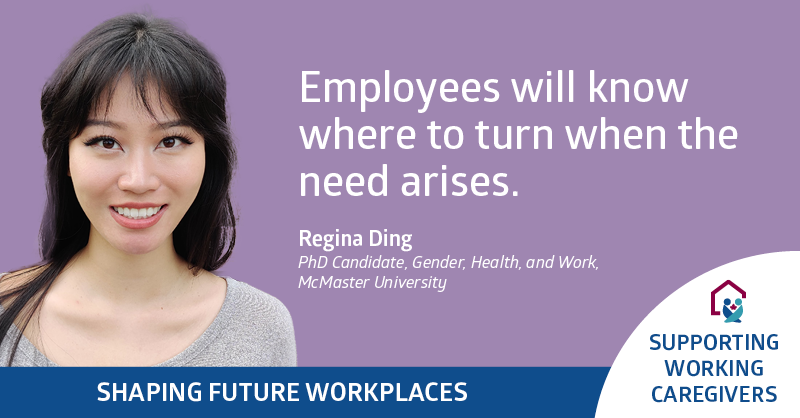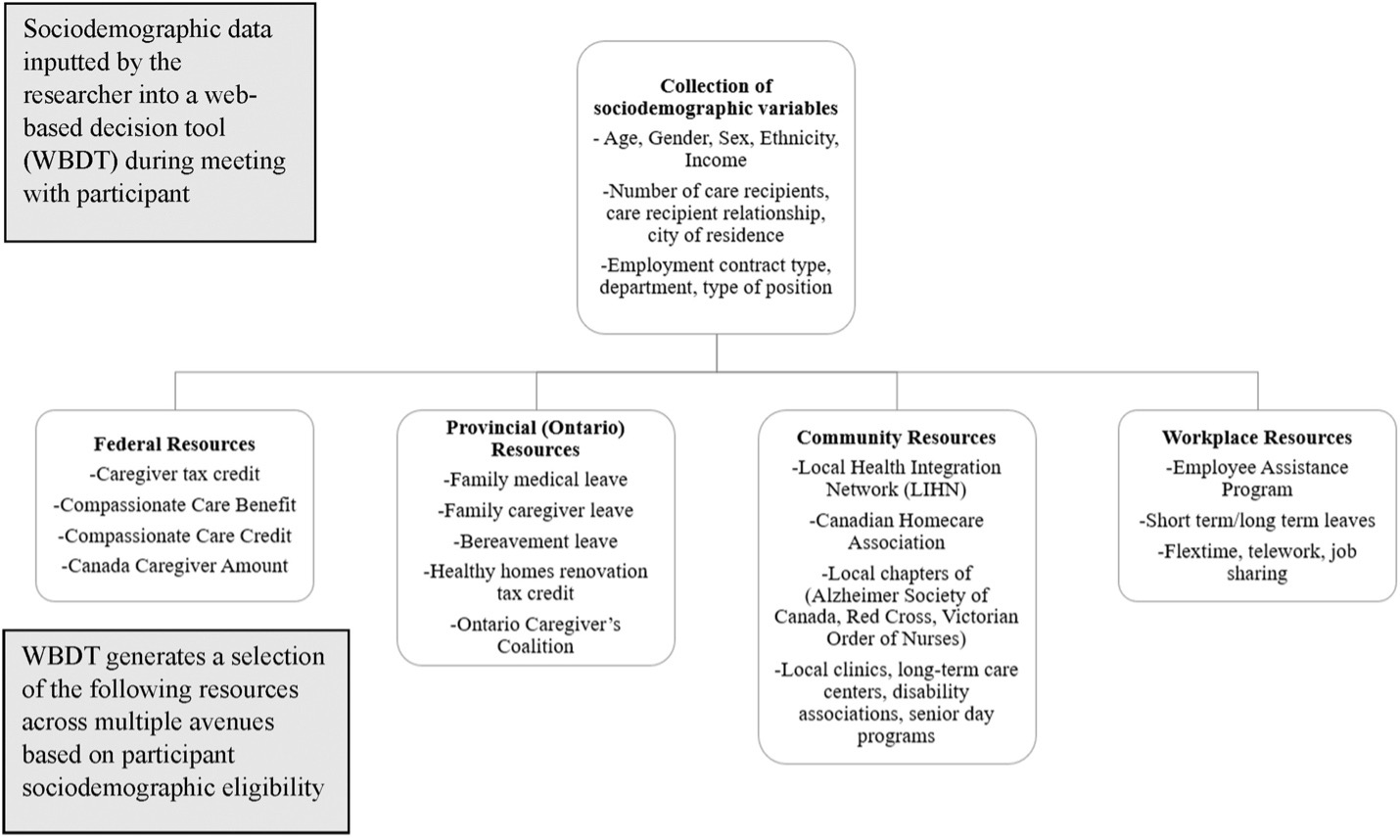Workplace Interventions Supportive of Caregiver-Employees
Does the implementation of carer friendly workplace practices (CFWP) improve workplace experience, or does it reach a saturation point?
This blog describes another component of the multi-phase research project initiated in 2016 and described in the blog dated February 3, 2022[i]. In this study, the impacts on carer-employees’ (CE) workplace experiences after an educational intervention were assessed.
Carer-employees experience mental and physical stress and are economically impacted by time and space constraints between caregiving, work, and nonwork. CEs may incur caregiving costs across five domains:
- lost income
- reduced future earning potential
- reduced employment benefits
- out of pocket caregiving expenses
- and unpaid labor.[ii]
Employers are also impacted by the stress of their CEs, in the form of reduced productivity, poor employee morale, employee turnover, and higher overall stress.[iii] Other reported consequences include taking leaves from work; reducing work hours; being denied employment, and quitting.[iv] Consequently, workplaces have incentive to support their CEs, who are often highly skilled in industry-specific knowledge, at the peak of their careers, and in senior positions.
The sample size at the end of the two-year web-based educational intervention study consisted of 21 participants. Data was collected on outcome variables such as work-role function, work-family conflict, supervisor support and co-worker support, both before and after the intervention. Seven different scales were used to assess aspects of workplace experience: 1) work role function; 2) job satisfaction; 3) scheduling control; 4) work-to-family conflict; 5) family-to-work conflict; 6) family supportive supervisor behavior, and 7) co-worker support.
The intervention session was an in-person meeting conducted individually with each participant. Once demographic and carer-specific information were submitted into the web-based decision tool (WBDT), the tool highlighted information and resources for carers at the federal, provincial, community, and workplace level, to equip them with the necessary information to best manage their own balance between work and caregiving roles (see figure below).
Overall, intervention participants reported less work family conflict, better supervisory and co-worker support. The findings provide meaningful evidence for the effectiveness of educational interventions aimed at improving the work experience for CEs, particularly soon after the delivery of the intervention
The findings suggest the need for regularly scheduled educational sessions. Further research may need to be conducted to assess generalizability of our findings across different workplaces and sectors.
Learn more from the published paper.
References
[i] See: The impact of the workplace in the lives of carer-employees
[ii] J.E. Fast, D.L. Williamson, N.C. Keating The hidden costs of informal elder care Fam Econ Nutr Rev, 13 (2001) 120–120 Google Scholar
[iii] J.E. Fast, D. Lero Modern caregiving in Canada, vol. 44, Vanier Inst Fam (2014)
[iv] Government of Canada E and SD Canada When work and caregiving collide : how employers can support their employees who are caregivers : em12-8/2015E-PDF Government of Canada Publications – Canada.ca (2002) http://www.publications.gc.ca/site/eng/9.700220/publication.html, Accessed 11th May 2020 Google Scholar
ABOUT THE PROJECT
Carers Canada is leading the knowledge mobilization activities for a multi-sectorial research program to spread and scale a carer-friendly workplace standard, known as the Carer-Inclusive and Accommodating Organizations’ Standard (CSAB701-17). Led by Dr. Allison Williams, CIHR Research Chair in Gender, Work and Health at McMaster University, the research program consists of six inter-related sub-projects that will: increase awareness of the standard across Canada; evaluate readiness to change; determine feasibility and cost benefit; embrace cultural competency; consider Indigenous perspectives; and create an international standard. Visit PARTNERSHIP PROJECT SITE here

CIHR/SSHRC Healthy Productive Work Partnership Grant “Scaling up the Career Inclusive Accommodating Organizations Standard” FRN: HWP-146001 (CIHR); 890-2016-3018 (SSHRC).
 Regina DingMarch 16, 2022
Regina DingMarch 16, 2022

Workplace Interventions Supportive of Caregiver-Employees
Does the implementation of carer friendly workplace practices (CFWP) improve workplace experience, or does it reach a saturation point?
This blog describes another component of the multi-phase research project initiated in 2016 and described in the blog dated February 3, 2022[i]. In this study, the impacts on carer-employees’ (CE) workplace experiences after an educational intervention were assessed.
Carer-employees experience mental and physical stress and are economically impacted by time and space constraints between caregiving, work, and nonwork. CEs may incur caregiving costs across five domains:
- lost income
- reduced future earning potential
- reduced employment benefits
- out of pocket caregiving expenses
- and unpaid labor.[ii]
Employers are also impacted by the stress of their CEs, in the form of reduced productivity, poor employee morale, employee turnover, and higher overall stress.[iii] Other reported consequences include taking leaves from work; reducing work hours; being denied employment, and quitting.[iv] Consequently, workplaces have incentive to support their CEs, who are often highly skilled in industry-specific knowledge, at the peak of their careers, and in senior positions.
The sample size at the end of the two-year web-based educational intervention study consisted of 21 participants. Data was collected on outcome variables such as work-role function, work-family conflict, supervisor support and co-worker support, both before and after the intervention. Seven different scales were used to assess aspects of workplace experience: 1) work role function; 2) job satisfaction; 3) scheduling control; 4) work-to-family conflict; 5) family-to-work conflict; 6) family supportive supervisor behavior, and 7) co-worker support.
The intervention session was an in-person meeting conducted individually with each participant. Once demographic and carer-specific information were submitted into the web-based decision tool (WBDT), the tool highlighted information and resources for carers at the federal, provincial, community, and workplace level, to equip them with the necessary information to best manage their own balance between work and caregiving roles (see figure below).
Overall, intervention participants reported less work family conflict, better supervisory and co-worker support. The findings provide meaningful evidence for the effectiveness of educational interventions aimed at improving the work experience for CEs, particularly soon after the delivery of the intervention
The findings suggest the need for regularly scheduled educational sessions. Further research may need to be conducted to assess generalizability of our findings across different workplaces and sectors.
Learn more from the published paper.
References
[i] See: The impact of the workplace in the lives of carer-employees
[ii] J.E. Fast, D.L. Williamson, N.C. Keating The hidden costs of informal elder care Fam Econ Nutr Rev, 13 (2001) 120–120 Google Scholar
[iii] J.E. Fast, D. Lero Modern caregiving in Canada, vol. 44, Vanier Inst Fam (2014)
[iv] Government of Canada E and SD Canada When work and caregiving collide : how employers can support their employees who are caregivers : em12-8/2015E-PDF Government of Canada Publications – Canada.ca (2002) http://www.publications.gc.ca/site/eng/9.700220/publication.html, Accessed 11th May 2020
Regina is a final year PhD Candidate at McMaster University, researching population health and aging. Her dissertation focuses on the program evaluation of a workplace carer intervention for carers. Regina has an interdisciplinary background in life sciences and environmental sciences prior to her work at McMaster, although she has always been interested in knowledge translation and scientific policy.
FAVORITE PASTIME: Most recently, pottery.
Twitter: @DingRegina
LinkedIn: @regina-ding-b53b871a1
ABOUT THE PROJECT
Carers Canada is leading the knowledge mobilization activities for a multi-sectorial research program to spread and scale a carer-friendly workplace standard, known as the Carer-Inclusive and Accommodating Organizations’ Standard (CSAB701-17). Led by Dr. Allison Williams, CIHR Research Chair in Gender, Work and Health at McMaster University, the research program consists of six inter-related sub-projects that will: increase awareness of the standard across Canada; evaluate readiness to change; determine feasibility and cost benefit; embrace cultural competency; consider Indigenous perspectives; and create an international standard. Visit PARTNERSHIP PROJECT SITE here

CIHR/SSHRC Healthy Productive Work Partnership Grant “Scaling up the Career Inclusive Accommodating Organizations Standard” FRN: HWP-146001 (CIHR); 890-2016-3018 (SSHRC).
